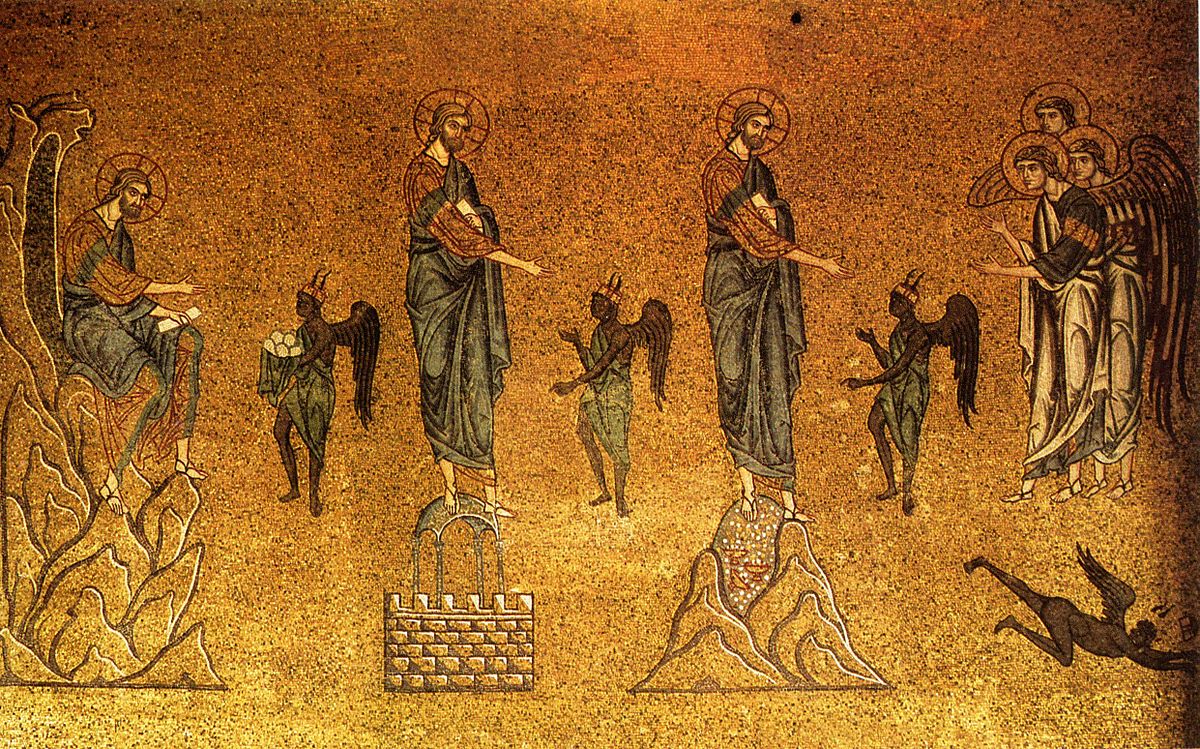This is the first Sunday in Lent. Are
any of you giving something up for Lent? My wife Lisa frequently gives up
cheeseburgers and fries—quite a sacrifice, as those of you who know her
understand. Maybe you’re giving up chocolate, or desserts? Or maybe you’re
taking something new on, like regular exercise? (Or maybe even something really
wild and crazy and out there, like Bible study and prayer?) Whatever discipline
you’ve decided on, there is no doubt that you will be facing temptations to
break it, and please know that you are all in my prayers for courage and a
steadfast heart this Lenten season.
Today’s readings are all about
temptation. In Genesis we see paradise crumble before our eyes, as the open
relationship Adam and Eve have with each other and with God is destroyed by
suspicion in God’s good gifts, then accusation. Alienation rules the day as Adam
and Eve eat the forbidden fruit, and then pass the blame to each other and the
serpent…We are all the children of Adam and Eve, as our fear and distrust alienates
us from God and from others in God’s family, and as we exploit the fruits of
the earth beyond the ability to sustain them, as we were tasked by God, and, as
we value possessions and comforts more than we value those who sometimes
literally slave to produce them.
Temptations are, I think, almost
always and ultimately about who and whose we are, about
where we get our meaning for life, about the wellspring of our being. The story
of Creation in Genesis is a story that tells us who and whose we are: we are part of God’s good and beloved creation,
made in God’s very image, with the very breath of God breathed into us, created
to tend the earth and help it and each other flourish and grow. But, as we say
in the confession, we have strayed from God’s ways: we do not love God with our
whole hearts, and we do not love our neighbors as ourselves. We have all taken
a bite from that forbidden fruit, putting ourselves in control rather than God,
and blaming others when things turn out badly. Cheating, revenge, stealing,
lying, over-indulging, … these are really questions about whether we are in God’s
control, or are possessed by something else. So, in a sense, Lenten disciplines
are temptation training. We are led by the Spirit to give up or take on
something to test who we are and whose we are.
Henry Nouwen, a Roman Catholic priest and
author of many books, explains it this way: The question we all go through life
asking ourselves is, “Who am I?” And we always come up with one of three wrong answers.
The first wrong answer—I am what I do. I make, I build, I climb the
career ladder, I get awards, I have a family…It is these things, my
accomplishments, that define me and give me value. The second wrong answer—I am
what people think and say about me. I seek fame and notoriety, seek likes
on Facebook and followers on Twitter. The third wrong answer, perhaps the most
common for us gather here, is—I am what I possess. The things that I buy, the
size of my house and the price tag of my car and my garage and shed full of
tools and toys, all of these things that I own, are what define me and
give me meaning, and prove that I am worth something. But, at the end of my
life, I may not be able to do very much—maybe illness will strip me of all
ability. Perhaps no one will really remember me. And, for certain, I can’t take
my things with me.
These three wrong
answers to the question “Who am I?” are the source of so much grief, and
grasping, and anxiety, and anger, and greed, and pain—for us, for our families,
and, truly, for the whole world. How we all suffer, how the planet
suffers, because we are all trying to solve the problem of our alienated
souls and find our source of meaning and value with these answers.
In today’s Gospel
reading, Jesus was tempted by Satan, and these are, if you think about it, the
same three answers Satan tried to get out of Jesus when he tempted him. “Jesus,
turn these stones into bread, prove who you are by what you do…” “Jesus, throw
yourself off this the pinnacle of this Temple, let the angels come and save
you, fill your ears with the praise of the people for your glory...” “Jesus,
bow down and worship me, and I will give you the whole world…I will give you everything.”
Jesus, however,
had, just before this temptation, come from his baptism. Jesus knew who
he was, and whose he was, because he heard the voice of God calling
out from heaven: “You are my beloved Son.” Jesus was able to face these
temptations, was able to face the journey to Jerusalem and his false trial and
tortured death, because he always knew he belonged only to God, and his worth
came only from being God’s beloved.
“Beloved, we are God’s children now,” 1 John
3:2 says. In our baptism
our alienation from God and from each other is ended, and we are fully
reconciled to our God, to our God who says: “I have called you by name,"
"I created you, I formed you," “I knew you in your mother’s womb
before you were born,” "I am with you always," "I will ransom
you, I have redeemed you," “I am the Lord your God, and I love you."
This season of Lent exists to give us
an intentional opportunity to come together, as a community and individually,
in prayer and study of scripture and perhaps in self-denial, in order to remember
who we are...At the table with his friends, Jesus said, “Do this in
remembrance of me," over the bread that is his broken body. At the table
with his friends, Jesus said, "Do this in remembrance of me," over
the cup that is his spilled blood. And so, we come to Jesus’ table here, and we
remember all that he refused Satan, and all that he embraced, and all that he
gave, for the sake of us all.
My prayer for us this week is that,
when we are tempted to alienation, tempted to power and possession and safety and
prestige and spectacle, we will respond instead with love and humility and
compassion, because we remember whose and who we are, who we all
are, in Jesus: the beloved children of God. Amen.





Comments
Post a Comment